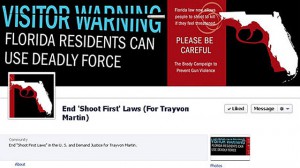It is now widely known that George Zimmerman, a self-appointed volunteer neighborhood watchman in Sanford, Florida, shot and killed unarmed African American teen Trayvon Martin in February 2012. When police questioned Zimmerman immediately after the shooting he claimed self-defense, even though he pursued the boy against the advice of a 9-1-1 operator. Last Saturday a jury found Zimmerman not guilty of all charges stemming from the shooting and he left the courthouse innocent in the eyes of the law. The verdict induced strong reactions around the country, including an avalanche of discussion on social media, a number of protests, and, in Oakland, violent demonstrations that damaged downtown businesses. Much of the discussion has centered on systemic racism, how it impacts the lives of people of color, and villainizes youth victims.
Also at the center of the controversy is a discussion about Florida’s “stand your ground” or “shoot first” law. According to the Law Center to Prevent Gun Violence, the law says that “a person who reasonably believes that deadly force is necessary to prevent imminent death or great bodily harm has no duty to retreat from a confrontation outside the home before engaging in deadly force.” The site goes on to say, “In reality, Florida’s law shields individuals who use deadly force to injure or kill, by granting civil and criminal immunity to any shooter who convinces a judge that he or she reasonably believed a threat existed by a preponderance of the evidence.” During closing arguments, the defense claimed that Martin had “weaponized the sidewalk” to bludgeon Zimmerman during the confrontation in which Zimmerman shot him through the heart with a concealed 9mm Kel-Tec pistol.
 Artist Stephanie Syjuco
Artist Stephanie Syjuco
Artists, writers, and activists immediately began to make work in response to the verdict. The next morning, Bay Area-based artist Stephanie Syjuco posted on Facebook an image of herself lying facedown on the cement in an empty parking lot, akin to media images of Martin’s lifeless body after the shooting. The image, she said, is “a kind of face-plant in reaction to recent political events” and went on to say, “as in the Zimmerman trial, this image takes on a Rashomon-like effect.” The nature of what transpired is unclear, but the image is unsettling and, the artist hopes, provocative.
After Zimmerman was found not guilty, a flood of recrimination in the news and social media was focused on Florida’s legal system, as if the legality that enabled the verdict was limited to Florida. This distancing, this need to place Florida in a category of otherness, provided some with a sense of exoneration. Whatever is happening there is not my problem, seemed to be the prevailing message. One poster on Facebook commented, “Say what you want about Global Warming, it’s going to erase that tumor of a state known as Florida.” But in reality thirty-one states, including Florida, have adopted “Shoot First” statutes since 2005. Each generally permits the use of deadly force in self-defense in public places with no duty to retreat. The evident racism in “stand your ground” states is stunning: according to a recent study conducted by John Roman, a senior analyst at the Urban Institute’s Justice Policy Center, white people who kill black people are 354% more likely to be cleared of murder, as recently reported in the United Kingdom’s Daily Mail. In response to the verdict, the NAACP launched a petition urging the Department of Justice to file civil rights charges against Zimmerman, stating that the organization would “fight for the removal of stand your ground laws in every state,” and vowed not to rest until “racial profiling in all of its forms is outlawed.”





